- Home
- Linda Byler
The Homestead Page 2
The Homestead Read online
Page 2
The wind spoke to Sarah of longing in a restless attack of homesickness so real it felt physical, as if a giant hand gripped her heart and squeezed. She lowered her head as hot tears squeezed from her eyes, trembled on her lashes, and dripped onto her stomach. When she turned her head to one side, the tears splashed on the wooden stake. Some fell into the thick brown grass, anointing the soil of North Dakota, her home, her place to live for the rest of her days on earth.
It was Hannah who marched down to the creek bed and swung an axe alongside her father. Her fierce energy finally had a productive outlet after months of travel. Her eyes flashed with renewed interest. She hacked and whacked and rode one of the horses to pull the logs to the site where their house would be built, her smooth white legs exposed until Sarah ran gasping in horror with a pair of Manny’s trousers and told her to wear them; they weren’t completely savage just yet. Hannah looked at her mother with narrowed eyes, asking who there was to see. No use putting on the constricting trousers.
Sarah spoke levelly, without anger. “Put them on. Get down off that horse and put them on.”
The flash of rebellion from Hannah’s eyes staggered Sarah. What was this? Resolutely she went to the horse’s bridle, faced Hannah’s anger, and repeated her order without taking her eyes off her daughter’s.
Hannah was the first to look away, followed by a slumping of her broad shoulders. One leg swung over, a quick slide, and she landed on her feet like a cat. Springing up, she took a few steps, grabbed the trousers from her mother’s grasp, held the offending garment up, hiked up her skirts and stepped into them, holding her skirts with her chin as she buttoned the waistband. Lifting the broadfall, she buttoned it without speaking.
Sarah held onto the bridle and stroked the faithful horse, still working after all those miles. For the first time she thanked God for the isolation, her daughter displaying an utter lack of discretion.
Turning, Hannah stood back, gathered herself again, so cat-like, Sarah thought. Hannah leaped, slung a leg over, grasped the reins and turned her head. The horse wheeled in response to the jerked left rein and galloped off in a spray of mud and wet grass.
Sarah lifted a hand to her forehead to shade her eyes and watched Hannah go until she disappeared into a hollow. That was the thing about this flat land, the deception of it. It wasn’t as flat as it appeared; only the grasses waving in the restless wind looked even. Sarah shuddered without knowing why. She returned to the camp by the Conestoga wagon and continued her ironing.
She had set up her ironing board between two stumps, so she lowered herself to sit and iron. The sadiron was no longer hot. She attached the handle, placed it on the red coals and loosened the handle to let it heat up. Mary looked up from the book she was reading, smiling sweetly at her mother before returning to her concentration.
Sarah sighed and watched the light playing on Mary’s gold-streaked head. Why did she bother ironing? There was no one to see, no one to care whether their clothes were wrinkled or soiled, or if they wore none at all.
She snorted, a derisive sound, surprising herself. Oh, this was only the beginning of having to think differently, of stepping outside her well-structured life. No longer would she be able to wash on Monday, iron on Tuesday, plant and harvest and go to church and visit relatives and live among decent, God-fearing folks who lived together in unity. Well, mostly. How well she knew the unhappiness of her Mose, how the long and complicated talk of his peers bothered him, unsettled his simple way of life and his uncluttered thoughts. She knew too that he loved everyone and never thought ill of one person, in spite of not agreeing with him. Rufus Bontrager was the worst. Loud, obnoxious, cutting into other men’s conversations to set them right with his own high opinion of himself, he rankled everyone’s good humor. Mose always said he was loud, yes. And yes, a mite grosfeelich. But Rufus knew how to shoe a horse. He had a gentle hand in spite of his brute strength. When they lost their farm, he was the first to extend sympathy and shod both horses without charge.
Mose would never forget that act of kindness. And yet, he couldn’t stay in Lancaster County. Ah, there was the mystery for Sarah. Would she ever understand his reasoning for going out and buying that still and making whiskey illegally to sell to disreputable men? The shame that followed, the women’s unhidden pity as they let her pass along the row of benches in church.
Fresh shame washed over her, remembrance as painful as daggers. Her Mose. In the end, though, she reasoned a sensible answer to herself, that desperate men did desperate things. Mose was just trying to save the farm and his good reputation. The hurt settled into her bones, evened out, faded, but stayed, like an arthritis only time could cure.
She missed going to church the most. The easy chatter of the women, the admiring of babies, young mothers bending to tie their little girls’ head coverings, stashing their shawls and bonnets on tables or benches provided. Shaking hands, bending forward to give and receive the holy kiss, their traditional way of greeting one another. She could still feel the papery softness of Grandmother Miller’s loose cheeks, the smell of starch from her covering, the wide strings beneath the soft, loose folds of her neck.
She lifted the sadiron and resumed ironing. A chill rushed up her spine as the grasses swayed and bent. The campfire hissed, crackled, threw sparks as the flames flared up by the wind.
Soon the chilly winds would stop. Soon the warm sun would win. Sarah became quiet inside herself knowing her time would be here then. They must find someone, somewhere. The quick panic that rose within her was successfully pushed back by her whispered prayers. She believed God was out here with them. She couldn’t believe otherwise or she’d be swept away by her fear, her lack of trust in Mose, whom she had promised to obey, to love, to care for.
She put the ironing aside, shrugged on a light coat, and asked Mary if she would like to accompany her to the creek bed to watch her father cut down trees. Mary eagerly rose to her feet, grasping her mother’s hand and looking up into her face as they set off down the path made by the horses dragging logs up from the creek.
Soon it would be time for their evening meal, the preparations still unfamiliar after all these months on the road. Sarah could never feel as efficient or in control as she had back in her own kitchen. Now she always reverted to soups or stews or cornmeal mush. A campfire was an unhandy thing in spite of the grate and the iron rod set up between two sturdy posts to hold the blackened kettle above the fire.
Sarah squeezed Mary’s hand and smiled down at her. “Soon we’ll have a house, Mary!”
“Yes, we will. Dat said we will.”
Ah, to be young. To trust with that childish, doubt-free trust that erased every worry. Sarah only hoped—with a doubt-ridden hope speckled with fear—that they would have a house and beds to sleep in by the time the baby arrived.
She thought of Abraham and Laban’s flocks of sheep. The Old Testament described them as pure white or speckled with color—the impure ones. If she put her faith beside her small daughter’s, her own sheep would be the ones spangled heavily with the impurity of brown spots.
CHAPTER 2
The walk through the heavy grass left Sarah surprisingly breathless, considering they were headed slightly downhill. Mary chattered by her side, sometimes racing foolishly after small brown birds she had no chance of catching. Running back to Sarah, bent over, her tongue hanging like a winded puppy, she waved her arms up and down in exaggerated effort.
Sarah laughed, the sound almost frightening in its unnatural, hoarse explosion. Mary laughed with her without noticing any change in the sweet mother she knew and loved. For this, Sarah was deeply grateful. She had to do better, to find a place deep within herself and draw on this source for strength and courage. Lifting her head, Sarah vowed to rise above the most difficult situation without allowing Mose or the children to see her inner struggle. There was a word for that, a Dutch word, but she could not remember it.
They came to the group of trees where the grasses thinned and the
wide creek wound its way among them. At the far end there were the patient horses, tethered to each other, heads hanging straight in the quiet repose of a sleeping animal. There were five logs, straight ones, cut and ready to be hauled to the house, a pile of twigs, thin branches and brush, and another tree laying along the creek. At one end, Mose lifted the axe and brought it down precisely into the whitish crevice where it had struck many times before. Hannah whacked away at another tree in short, swift strikes, her face red with exertion, working twice as hard as Mose but accomplishing little except wearing herself out.
Manny was hacking small branches off the fallen trees, dragging them to the brush pile and walking with a sense of newfound purpose, his old gray hat brim flopping over one eye, torn away from the crown, and his dark hair spilling out like extra stuffing.
He caught sight of his mother, waved and grinned and called out to them before continuing his work. Mose stopped, wiped his face and turned, his face creasing with pleasure at the sight of his lovely Sarah and Mary. Hannah stopped, scowled, turned her back, and resumed her senseless whacking.
Mose laid down his axe and stepped away from his work to greet them. Dressed in patched denim broadfall trousers, an old blue chambray work shirt, the sleeves rolled above his elbows, the muscular arms straining every seam, he never appeared more handsome to Sarah. Gladness lit up her face, evincing radiance from within. The light drew Mose and had drawn him since he was young. “Sarah! So you came to see what we’re doing? Good for you. And my best Mary.”
He laughed as he kissed Sarah’s cheek, one arm about her waist, drawing her close. She smiled up at him, their souls united in their searching gaze, seeking, finding, content for all the ages, being together, bound by their love.
When did she first think of Eli? Who spoke of him first? Mary or Mose? Was it herself? She could only remember the yawning pit of realization that Eli was not here with Mose.
“I thought he was with you.” She was never sure who said the words first but knew instantly that something was terribly wrong.
Sarah’s hands went to her mouth. Her brown eyes searched her husband’s face as if she could gain entry to a reassurance in the depth of his brown eyes. “Where is he?” she whispered hoarsely.
“Wasn’t he with you at all this morning? This afternoon?” Mose’s voice was quick, firm.
“No. No.” Sarah shook her head and pointed a shaking finger at Mose. “I thought he was with you.”
“He wanted to come with me but I told him no. He was to stay with you.”
Sarah’s first thought was to run. She wanted to flee the terrible specter of a missing child on this immense prairie with its hidden hollows and swells, the grass waist high in some places.
With the realization that Eli was lost—she could not run from this fact—came the knowledge of hope, of bare spots where he could gauge his surroundings. She became rational, pushed back the panic, searched Mose’s eyes.
“He can’t be too far. Did he not come with you at all?” she asked, her mouth becoming dry with her accelerated breathing. She licked her lips, tried to swallow.
“When I told him to stay, he was headed to the wagon. After that, I can’t remember seeing him.” His brown eyes filled with tears as his brow furrowed. He turned to the four directions, shading his eyes, searching the far-flung reaches of this strange and mysterious land.
Mary’s eyes became troubled, large and round with concern. “Mam, he told me he was going rabbit hunting.”
Sarah looked at Mary and grasped her shoulders with hands like claws, clamping down until she winced, shook herself away, and began crying.
“Tell me, where did he go?” Sarah ground out between clenched teeth.
Mary shrugged, sobbing now, her soft heart shattered by her mother. A kind of hysteria gripped her. Sarah began talking, moving away, moving back, babbling incoherently. The thought of their Eli, so short and stocky and manly, reduced to shrill cries of terror without knowing where he was and how he would find his family—it was almost more than her heart could bear.
He was her child, her baby. For six years he had been the youngest, the only one she had to cuddle and love, and now they had brought this innocent child to this terrifying, grasping prairie, this strange restless, treeless land of no mercy. A great sea of grass that was capable of swallowing children.
Mose came up with a plan. He told Hannah and Manny to stay together and keep calling, never losing sight of the treetops. Hannah listened to her father’s words, her head bent to keep her emotions hidden, before saying that the whole plan was senseless on foot. Why not ride the horses? So Mose allowed it, watching both of the older children mount their horses and ride off up a small grade, the grass coming to their boot tops. Dimly they heard them calling, “Eli! E—li!” as the prairie and the sky swallowed them whole.
It was then that Sarah began sobbing—dry, harsh sounds of a mother’s despair when a child is lost. Mose turned to take her in his arms, the sounds from her twisted face a form of torture to him.
“Don’t, Sarah, my Sarah. Please don’t. We’ll find him. He’s a tough little chap. We won’t let him die. You and Mary go back to the house now and build a roaring fire. Maybe he’ll see the smoke and find his way home. I’ll start walking in the direction God lays on my heart. I’ll see where He leads me by my prayers. Now go, my precious Sarah, put your faith in God. He’ll take us through this valley.”
He reached into his trouser pocket for a worn, wrinkled square of cotton fabric, lifted her chin and wiped her cheeks tenderly, searching the closed lids of her anguished eyes as if he could see through them and find his Sarah beneath them. As it was, the pain on her face became mirrored on his own. His smooth, untroubled features were now drawn, as lines appeared on his forehead and he became one with his heartbroken wife.
“Go now,” he said gently, as he placed a kiss on her forehead. She stumbled away, the grasp of Mary’s hand the only thing that kept her from falling. Mary was wide-eyed, serious, but too young to absorb the significance of a lost child in a strange land.
When Sarah looked up through streaming eyes that squinted painfully against the afternoon light, the prairie and the sky above appeared clouded in menace. The whole circumference of her world was ripe with portent.
They would not find six-year-old Eli. He had already been gone at least eight hours without returning, which meant he had gone too far to find his way back. These wide, harsh grating grasses never stopped their whispering, their rasping against each other. Their unstable movement deceived the eye with the appearance of sameness, and yet the height and depth was not similar at all. What if Eli stumbled onto a lowland, a swamp with mud underfoot and grasses above his head? He could wander for days in circles, never being found until it was too late.
The thought was too bitter, she could not tolerate the suffering of her small, squat son, the mighty one, the temper that flared like Hannah’s. She kicked the red coals of the campfire, scattering the ashes, threw a handful of small wood pieces on top and watched it flare up. Dry-eyed with fear, she carried larger pieces of wood, rolling them expertly on top of the flames, watching the thick white smoke reach upward.
Oh, Eli, see this smoke. Look in this direction wherever you are. Taking a deep breath, she steadied herself, stood straight and searched the horizon, the far reaches of this endless land that contained nothing but grass. She shivered, hostility like goose bumps on her spine.
She had blindly followed Mose to this forsaken country, trusting his judgment, leaving her own will behind like clouds of dust curling from beneath those sturdy Conestoga wagon wheels. Here they were, cursed, fer-flucht. It was his disobedience to God with that insanity, that whiskey stilling. God is not mocked. What a man soweth, thus must he reap.
Oh, but he had repented though. Yes, he had, and truly. What had the bishop said? Though your sins are scarlet, I will make them white as snow. Clean like sheep’s wool. Who was to know God’s ways?
She threw another chunk
of wood on the fire and watched the thick smoke curl, lift off, spreading upward, and on up. Look down on my offering, Lord. Accept it graciously the way you did for Abel all those many years ago. Accept my desperation, Lord, and return my son to me.
The sun’s light was dimming now as it began its ascent into the waving grass. A chill crept across Sarah’s arms and she shivered again. Darkness would come, inevitably. A darkness so black it would crush her if Eli was not found. She bit down on her lower lip, her teeth beginning to chatter with the new fear of day’s end. She would not sleep, ever, until they found Eli.
But darkness came and with it a separation from any source of human comfort. Her husband and two oldest children were gone, for all she knew they were lost too, never to return. She paced the perimeter of the camp, tried to scale the walls of the house for a view of the darkness around her. Anything except to sit by the wagon and the half-built house with Mary quietly watching her with hazel eyes and helplessness.
Sarah could not comfort her daughter; she could not comfort herself. She felt cold toward Mary, a strange removal of feeling. She did not want Mary to see her like this. She wanted only Eli. To see his black hair sprouting from his hat, his open, laughing mouth, his snapping brown eyes, so alive, so eager and full of ideas, so restless in all of his imaginings.
Mary’s whimpering about hunger brought a deep shame, a scramble to set things right. A slice of cold corn pone, some beans warmed by the fire. Sarah sat with her while she ate, an arm around the thin little waist. She assured Mary they would bring Eli back, and told her to put on her warm nightdress. Sarah tucked the girl into her bed in the wagon, with difficulty now, but she managed. Since the hour was much later than her accustomed bedtime, Mary breathed lightly, tucked her hands beneath her cheek and fell asleep almost as soon as Sarah pulled up the heavy woolen blankets.

 A Second Chance
A Second Chance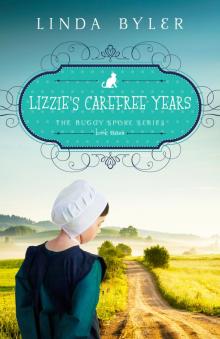 Lizzie's Carefree Years
Lizzie's Carefree Years The More the Merrier
The More the Merrier Love in Unlikely Places
Love in Unlikely Places Running Around (and Such)
Running Around (and Such) Wild Horses
Wild Horses Lizzie Searches for Love Trilogy
Lizzie Searches for Love Trilogy Lizzie and Emma
Lizzie and Emma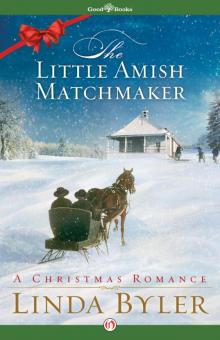 Little Amish Matchmaker
Little Amish Matchmaker The Witnesses
The Witnesses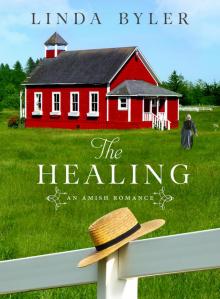 The Healing
The Healing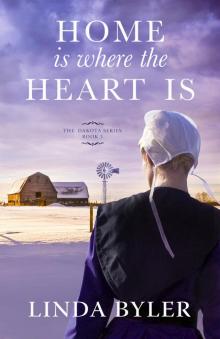 Home Is Where the Heart Is
Home Is Where the Heart Is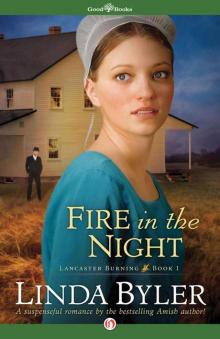 Fire in the Night
Fire in the Night When Strawberries Bloom
When Strawberries Bloom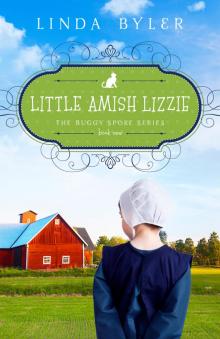 Little Amish Lizzie
Little Amish Lizzie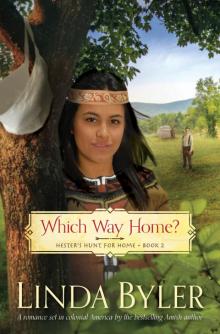 Which Way Home?
Which Way Home? The Homestead
The Homestead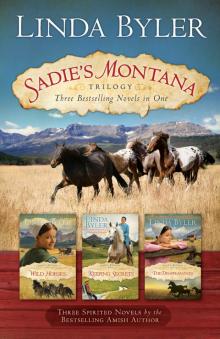 Sadie’s Montana Trilogy
Sadie’s Montana Trilogy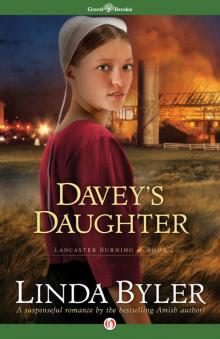 Davey's Daughter
Davey's Daughter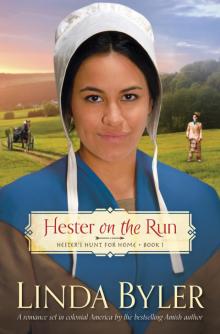 Hester on the Run
Hester on the Run Disappearances
Disappearances Big Decisions
Big Decisions Becky Meets Her Match
Becky Meets Her Match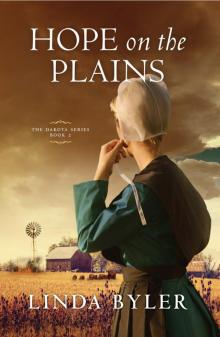 Hope on the Plains
Hope on the Plains Christmas Visitor
Christmas Visitor